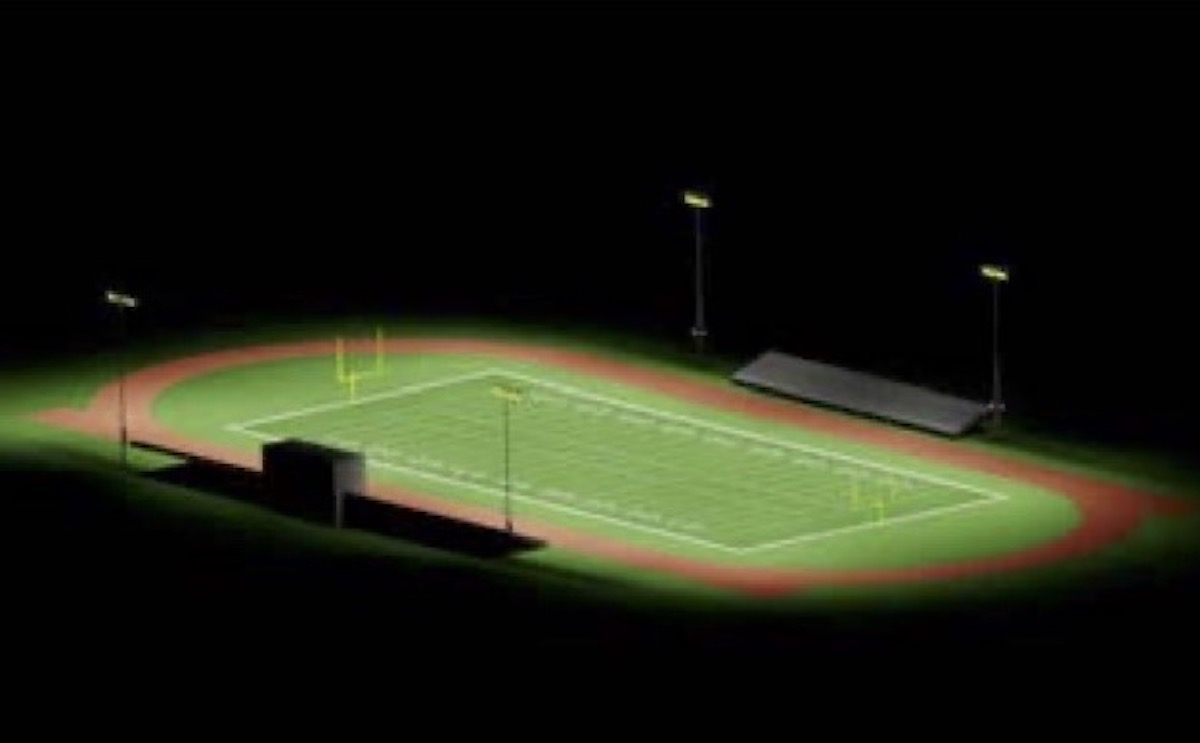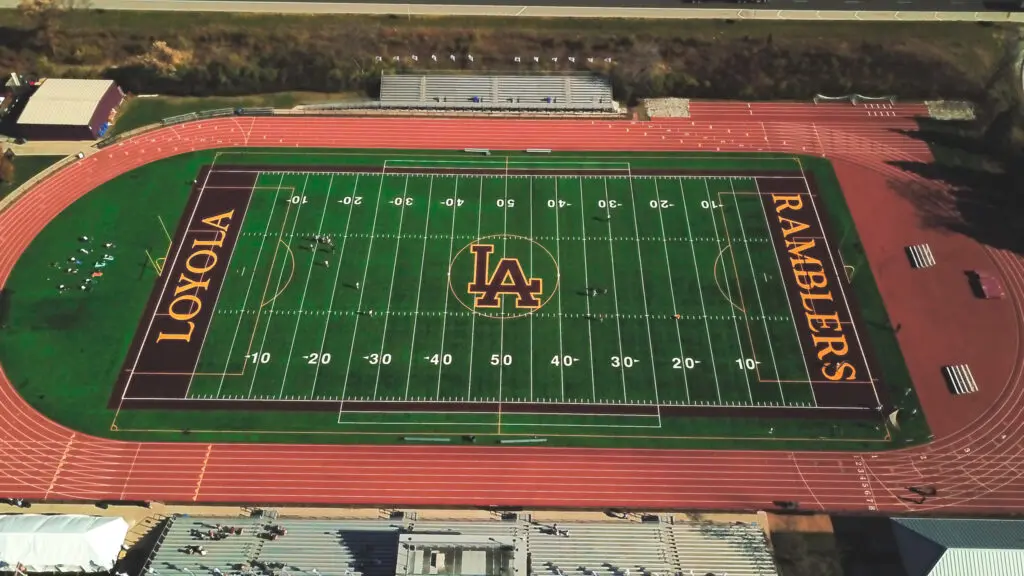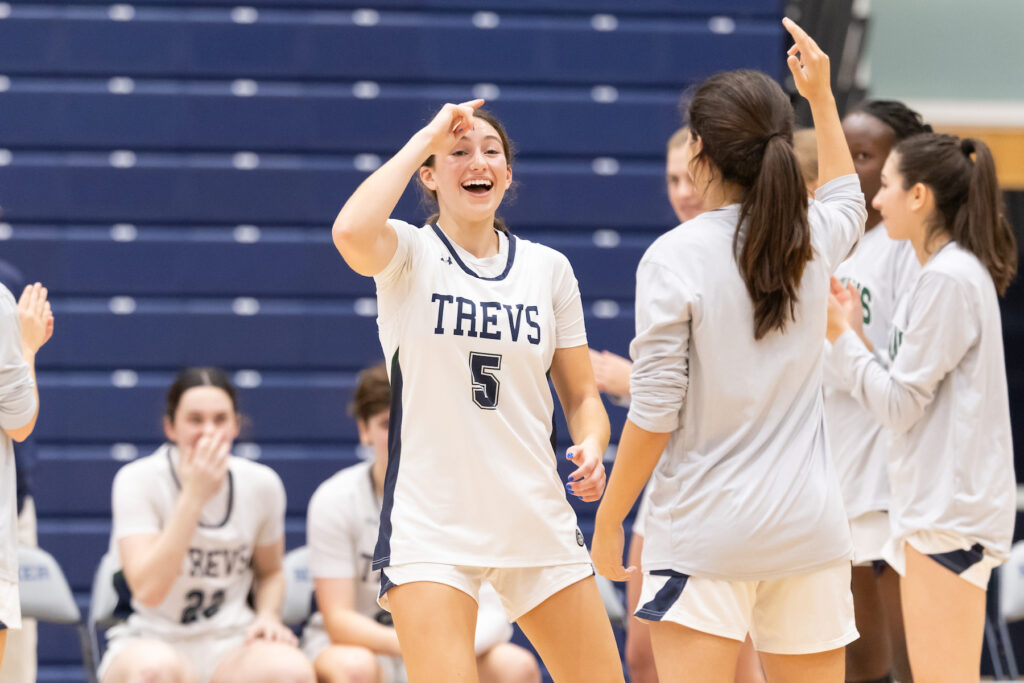
Loyola runs play for stadium lights but faces challenge from neighbors
Public hearing on issue on Sept. 6
A top football program in the state, Loyola Academy is used to the figurative spotlight. But the literal lights rarely shine on the Ramblers, who play their home games in a daytime-only stadium.
The Wilmette high school is aiming to change that, and not just for the football team, according to a proposal submitted to Village Hall.
Citing a “substantial programming and operational need,” Loyola Academy is requesting to install four, 80-foot light poles — two on each side of Hoerster Field — at Sachs Stadium for use up to 60 nights per year, broken up into a maximum of five Friday football games (10:30 p.m. curfew), 60 practices (7 p.m.) and 25 nonfootball (lacrosse, soccer, track and field) competitions (9 p.m.).
The request is the subject of a public hearing in front of the Wilmette Zoning Board of Appeals at 7 p.m on Wednesday, Sept. 6, at Village Hall, 1200 Wilmette Ave.
“The lights Loyola seeks to install, which Loyola has determined are necessary for the continued success of the institution, are typical for high school-level athletic facilities,” according to Loyola’s zoning application. “… The lighting will be professional designed, and the post-sundown use of the athletic field will be carefully and thoughtfully planned, regulated, operated and managed to mitigate negative impacts on the surrounding neighborhood and nearby residential properties.”

Loyola Academy has one of the few stadiums in the area that is not lighted. The Record reported in December 2022 that Loyola was preparing to formally seek stadium lights, collecting donations in its Champions Campaign that marketed the lights and letting the Village of Wilmette know of its intentions.
To go through with the lights, Loyola Academy needs the Village of Wilmette to approve, among other requests, the height of the light poles, the brightness of their illumination and the volume of the potential stadium noise — all of which are projected to eclipse zoning regulations.
According to Loyola’s application, prepared by the Lakota Group, the lighted field would only be used by Loyola students and student-athletes, and under this proposal could not be rented out for third-party events, including concerts.
Opposition to lights at Loyola’s stadium formed prior to the school’s zoning application, with residents concerned at traffic and parking congestion, noise and light pollution, and community safety. Some residents even launched a website, No Loyola Lights, to organize the opposition.
“Loyola’s neighbors already deal with traffic, noise and other disturbances related to its operations, but only occasionally in the evening when non-athletic events take place,” it says on the website. “There is no capacity for more disturbance, particularly in the evening which in general is a time of respite.”
The school hosted community open houses in February and June to discuss its plans. Its application says based on feedback Loyola reduced the number of propsed lighted events by about 67 percent (from 183 to 60) and set earlier cut-off times for the lights.
The application says the school wants to continue interacting with the community.
“Loyola Academy continues to foster a positive relationship with our neighbors and remains committed to addressing and monitoring any current and future impacts to the neighborhood as part of its continued operations,” it says.
Loyola’s application includes parking and attendance studies that show home football games — the highest attended of the potential stadium uses — averaged 2,079 attendees over eight Saturday contests (2 playoff) in 2022. That total, Loyola says, includes two “unicorn,” or anomalous, games: the opener that was broadcast on ESPN and brought 5,500 guests, including 2,200 from another state; and a matchup with Mt. Carmel when the Ramblers and Caravan were widely considered the best two teams in Illinois. It drew 4,029 people. Among the other contests, three were under 700 guests and three over 900.
If lighted Friday games are allowed, Loyola said it would not permit neighborhood parking, using barricades and signage, and consider more off-site parking solutions, support increased parking fines and enable more enforcement.
A noise study, also included in the study, estimates that noise created from regular-attendance home games would be “just noticeable” over the ambient noise produced by neighboring Edens Expressway. The study based the estimation on 2007 sound data taken from a highly attended football game in Oak Park.
As for lighting, Loyola projects its purchase of industry-best technology will control spillage and glare, and it pledges to request police officers and increase personnel to control security.
Following the zoning hearing Sept. 6, Loyola’s request would be in front of the Wilmette Village Board on Sept. 26.
The Record is a nonprofit, nonpartisan community newsroom that relies on reader support to fuel its independent local journalism.
Subscribe to The Record to fund responsible news coverage for your community.
Already a subscriber? You can make a tax-deductible donation at any time.

Joe Coughlin
Joe Coughlin is a co-founder and the editor in chief of The Record. He leads investigative reporting and reports on anything else needed. Joe has been recognized for his investigative reporting and sports reporting, feature writing and photojournalism. Follow Joe on Twitter @joec2319


